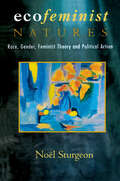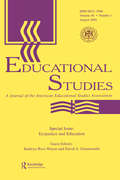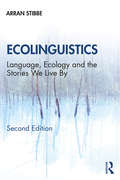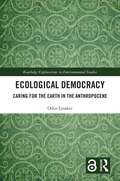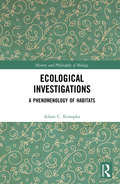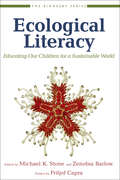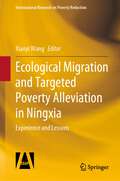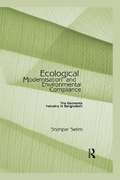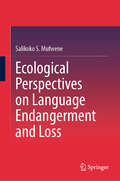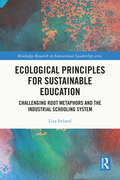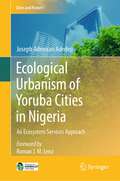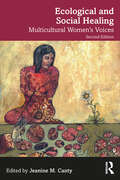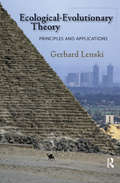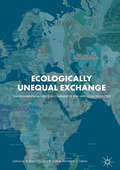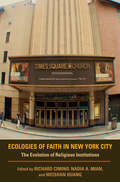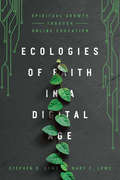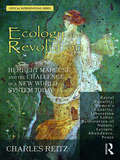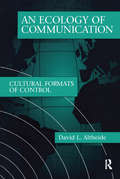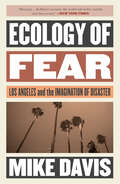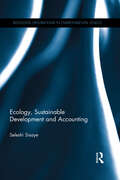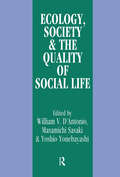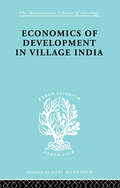- Table View
- List View
Ecofeminist Natures: Race, Gender, Feminist Theory and Political Action
by Noel SturgeonExamining the development of ecofeminism from the 1980s antimilitarist movement to an internationalist ecofeminism in the 1990s, Sturgeon explores the ecofeminist notions of gender, race, and nature. She moves from detailed historical investigations of important manifestations of US ecofeminism to a broad analysis of international environmental politics.
Ecojustice and Education: A Special Issue of educational Studies
by David A. Gruenewald Kathryn Ross WayneFirst Published in 2004. Routledge is an imprint of Taylor & Francis, an informa company.
Ecolinguistics: Language, Ecology and the Stories We Live By (Bloomsbury Advances In Ecolinguistics Ser.)
by Arran StibbeEcolinguistics: Language, Ecology and the Stories We Live By is a ground-breaking book which reveals the stories that underpin unequal and unsustainable societies and searches for inspirational forms of language that can help rebuild a kinder, more ecological world. This new edition has been updated and expanded to bring together the latest ecolinguistic studies with new theoretical insights and practical analyses. The book presents a theoretical framework and practical tools for analysing the key texts which shape the society we live in. The theory is illustrated through examples, including the representation of environmental refugees in the media; the construction of the selfish consumer in economics textbooks; the parallels between climate change denial and coronavirus denial; the erasure of nature in the Sustainable Development Goals; creation myths and how they orient people towards the natural world; and inspirational forms of language in nature writing, Japanese haiku and Native American writing. This edition provides an updated theoretical framework, new example analyses, and an additional chapter on narratives. Accompanied by a free online course with videos, PowerPoints, notes and exercises (www.storiesweliveby.org.uk), as well as a comprehensive glossary, this is essential reading for undergraduates, postgraduates and researchers working in the areas of Discourse Analysis, Environmental Studies and Communication Studies.
Ecological Democracy: Caring for the Earth in the Anthropocene (Routledge Explorations in Environmental Studies)
by Odin LysakerRe-Imagining Ecological Democracy offers an original, thought-provoking, and engaging treatment of why and how democracy should be re-imagined in reaction to today’s ecological crisis. The book explains that one need to re-imagine both the view on nature and democratic ideals within the same framework in the Anthropocene, the present geological epoch of human-made instability in the Earth system and its planetary boundaries. This book proposes unique and challenging readings of green political theory and its development of ecological democracy in the last four decades. The book is the first to offer a systematic and detailed interpretation of the role of critical theory vis–à–vis green political theory through an update regarding current non-anthropocentric critical theorists and how they may contribute to the further development of ecological democracy. Re-Imagining Ecological Democracy builds further on deep ecology, ecophenomenology, and animism by articulating an ecocentric view on nature which defends an intrinsic moral value of all existence as well as formulating the democratic principle of all ecologically affected parties. This book provides a sophisticated, convincing, and accessible argument for how to re-imagine ecological democracy as ecocentrism in practice: ecological love. To love ecologically means caring for and encountering all existence on the Earth and in the cosmos. This book is multi-disciplinary and will be of great value to researchers as well as undergraduate and postgraduate students from many disciplines.
Ecological Democracy: Caring for the Earth in the Anthropocene (Routledge Explorations in Environmental Studies)
by Odin LysakerEcological Democracy offers an original, thought-provoking, and engaging treatment of why and how democracy should be re-imagined in reaction to today’s ecological crisis. The book explains that one need to re-imagine both the view on nature and democratic ideals within the same framework in the Anthropocene, the present geological epoch of human-made instability in the Earth system and its planetary boundaries. This book proposes unique and challenging readings of green political theory and its development of ecological democracy in the last four decades. The book is the first to offer a systematic and detailed interpretation of the role of critical theory vis-à-vis green political theory through an update regarding current non-anthropocentric critical theorists and how they may contribute to the further development of ecological democracy. Ecological Democracy builds further on deep ecology, ecophenomenology, and animism by articulating an ecocentric view on nature which defends an intrinsic moral value of all existence as well as formulating the democratic principle of all ecologically affected parties.This book provides a sophisticated, convincing, and accessible argument for how to re-imagine ecological democracy as ecocentrism in practice: ecological love. To love ecologically means caring for and encountering all existence on the Earth and in the cosmos. This book is multi-disciplinary and will be of great value to researchers as well as undergraduate and postgraduate students from many disciplines.The Open Access version of this book, available at http://www.taylorfrancis.com, has been made available under a Creative Commons [Attribution-Non Commercial-No Derivatives (CC-BY-NC-ND)] 4.0 license.
Ecological Imperialism
by Alfred W. CrosbyPeople of European descent form the bulk of the population in most of the temperate zones of the world - North America, Australia and New Zealand. The military successes of European imperialism are easy to explain; in many cases they were a matter of firearms against spears. But, as Alfred Crosby maintains in this highly original and fascinating book, the Europeans' displacement and replacement of the native peoples in the temperate zones was more a matter of biology than of military conquest. European organisms had certain decisive advantages over their New World and Australian counterparts. The spread of European disease, flora, and fauna went hand in hand with the growth of populations. Consequently, these imperialists became proprietors of the world's most important agricultural lands. Now in a new edition with a new preface, Crosby revisits his now-classic work and again evaluates the global historical importance of European ecological expansion.
Ecological Investigations: A Phenomenology of Habitats (History and Philosophy of Biology)
by Adam C. KonopkaThese investigations identify and clarify some basic assumptions and methodological principles involved in ecological explanations of plant associations. How are plants geographically distributed into characteristic groups? What are the basic conditions that organize groups of interspecific plant populations that are characteristic of particular kinds of habitats? Answers to these questions concerning the geographical distribution of plants in late 19th century European plant geography and early 20th century American plant ecology can be distinguished according to differing logical assumptions concerning the habitats of plant associations. Through an analysis of several significant case studies in the early history of plant ecology, Konopka distinguishes a logic of habitats that conceives of plant associations in an analogy to individual organisms with a logic that conceives of plant associations in a reciprocal relation to habitat physiography. He argues that a phenomenological conception of the logical attributes of habitats can philosophically complement the physiographic tradition in early plant ecology and provide an attractive alternative to standard reductionism and holism debates that persist today. This wide ranging and original analysis will be valuable for readers interested in the history and philosophy of ecology.
Ecological Literacy
by Fritjof Capra David W. Orr Zenobia Barlow Michael K. StoneReorienting the way human beings live on the earth and educating children to their highest capacities have much in common, say the thinkers and educators behind this groundbreaking book. Both endeavors must be viewed and pursued in the context of systems: familial, geographic, ecological, political. And our efforts to build sustainable communities cannot succeed unless future generations learn how to partner with natural systems to our mutual benefit. In other words, they must become "ecologically literate."The concept of "ecological literacy" advanced by this book's creators, the Center for Ecoliteracy in Berkeley, California, extends beyond the discipline of environmental education. It aims, as David W. Orr writes in his foreword, "toward a deeper transformation of the substance, process, and scope of education at all levels."The reports and essays gathered in the book reveal the remarkable work being conducted by the Center's extensive network of partners. In one middle school, for example, culinary icon Alice Waters founded a program that not only provides students with healthy meals but teaches them to garden-and thus to study life cycles and energy flows-as part of their curriculum. Other hands-on student projects supported by the Center and described in the book range from stream restoration and watershed exploration to confronting environmental justice issues at the neighborhood level.With contributions from distinguished writers and educators, such as Fritjof Capra, Wendell Berry, and Michael Ableman, Ecological Literacy marries theory and practice based on the best thinking about how the world actually works and how learning occurs. Parents and educators everywhere who are engaged in creative efforts to develop new curricula and improve children's ecological understanding will find this book to be an invaluable resource.
Ecological Migration and Targeted Poverty Alleviation in Ningxia: Experience and Lessons (International Research on Poverty Reduction)
by Xiaoyi WangThis book assesses Ecological Migration and Precision Poverty Alleviation Measures, based on research conducted in Ningxia. “Resettling residents currently living in poor areas” is an important measure for “precise poverty alleviation.” China’s central government has provided extraordinary support for these areas, so as to help with “removing poverty nests,” “changing poverty industries,” and “pulling out the roots of poverty.”This book is mainly based on research conducted in Ningxia, one of the earliest areas in China to achieve poverty alleviation and development through immigration and relocation. Since the Twelfth Five-Year Plan, Ningxia’s ecological migration has been integrated into the process of new urbanization and industrialization. Poverty alleviation and relocation not only involves regional transfer, industrial transformation, and changes in livelihood, but also the social adaptation and integration of migrant groups. In addition to examining these aspects, the book shares stories of how impoverished individuals have succeeded in changing their fates.
Ecological Modernisation and Environmental Compliance: The Garments Industry in Bangladesh
by Shahpar SelimEconomic development that is environmentally, socially and ethically sound is at the forefront of contemporary debates all over the world. This is especially relevant to international trade where goods manufactured in least developed countries (LDCs) are being exported to developed countries (DCs) via international supply chains. This book looks at Bangladesh’s ready-made garments (RMG) industry – the seventh largest in the world — facing demands for environmental and social management according to standards set by consumers in environmentally progressive societies. Apart from these concerns not having found cultural or institutional resonance in Bangladesh, the pressures for cost reduction, on-time delivery and cheap labour in a highly competitive international market make the problem that much more complex. In this book Selim uses the analytical framework provided by the ecological modernisation theory to examine the economic, communicative and social political aspects of ethical trade, and argues that the economy-ecology relationship can indeed be a positive sum game if nation-states and economic actors change their policymaking styles and greening behaviour to take advantage of scientific evidence and green technological opportunities.
Ecological Perspectives on Language Endangerment and Loss
by Salikoko S. MufweneThis book discusses various issues arising from the dominant discourse on language endangerment and loss in linguistics. Are the terms mother tongue, heritage language, and ancestral language interchangeable? Does a child receiving formal education in a mother tongue different from that or those of his/her parents lose a culture that he/she &“should&” otherwise inherit? Is a language separate from the culture in which its speakers evolve and it is being practiced? Thus, is a population shifting to a dominant language necessarily abandoning its traditional culture ipso facto or is it also reshaping it along with that associated with the new language into a new, mixed culture? Are cultures intended to be static? Must speakers of particular languages be wedded to them in the same way they are to their genes? What can we learn about language shift, language vitality, and human adaptiveness from the protracted history of mankind? These and a host of other issues regarding the intertwining of colonization, globalization, language, and culture are discussed in this book, inviting linguists and other interested scholars to be critical participants in the current debate.
Ecological Principles for Sustainable Education: Challenging Root Metaphors and the Industrial Schooling System (Routledge Research in Educational Leadership)
by Liza IrelandThis book explores how the education sector can transition to being truly sustainable and why necessary innovations for educational change are being subverted and undermined when mapped onto the existing industrial educational system.Based on PhD case study research with schools that are modelling and teaching sustainability, action research, and the author’s 40 years of working in the K-12 system, this volume examines how education continues to perpetuate the status quo, and why education innovations are thus undermined. It shows the importance of redesigning education based on the principles of sustainable living systems and explores how this can be achieved across all levels of the educational system. The first part of the book establishes a new vision of sustainable education, whilst the second brings to light the industrial mechanistic root metaphors in current practice across leadership and administration, buildings and grounds, curriculum design, teaching, and learning that are subverting innovative efforts. From understanding the foundational, influential, problematic root metaphors of our "Industrial" educational system, it moves to explore how the ecological principles of sustainability can be used to rethink and redesign an educational system, from its administration, leadership, and policy, to curriculum, buildings, grounds and resources, through to teaching and learning, that will support sustainability, innovation, and creativity, developing systems thinking and sustainability as a frame of mind.Exploring how the education sector can transition to being truly sustainable and find new ways to traverse the problematic "Industrial" world view at this pivotal moment, will appeal to administrators, post-secondary educators, policymakers, and researchers and scholars of sustainability education, educational leadership, curriculum design, and educational philosophy.
Ecological Restoration and the U.S. Nature and Environmental Writing Tradition: A Rewilding of American Letters
by Laura SmithThis book presents a critical history of the intersections between American environmental literature and ecological restoration policy and practice. Through a storying—restorying—restoring framework, this book explores how entanglements between writers and places have produced literary interventions in restoration politics. The book considers the ways literary landscapes are politicized by writers themselves, and by conservationists, activists, policymakers, and others, in defense of U.S. public lands and the idea of wilderness. The book profiles five environmental writers and examines how their writings on nature, wildness, wilderness, conservation, preservation, and restoration have variously inspired and been translated into ecological restoration programs and campaigns by environmental organizations. The featured authors are Henry David Thoreau (1817–1862) at Walden Pond, John Muir (1838–1914) in Yosemite National Park, Aldo Leopold (1887–1948) at his family’s Wisconsin sand farm, Marjory Stoneman Douglas (1890–1998) in the Everglades, and Edward Abbey (1927–1989) in Glen Canyon. This book combines environmental history, literature, biography, philosophy, and politics in a commentary on considering (and developing) environmental literature’s place in conversations on restoration ecology, ecological restoration, and rewilding.
Ecological Urbanism of Yoruba Cities in Nigeria: An Ecosystem Services Approach (Cities and Nature)
by Joseph Adeniran AdedejiThis book offers in-depth ethnographic analyses of key informants’ interviews on the ecological urbanism and ecosystem services (ES) of selected green infrastructure (GI) in Yoruba cities of Ile-Ife, Ibadan, Osogbo, Lagos, Abeokuta, Akure, Ondo, among others in Southwest Nigeria. It examines the Indigenous Knowledge System (IKS) demonstrated for wellbeing through home gardens by this largest ethno-linguistic group in Nigeria. This is in addition to the ES of Osun Grove UNESCO World Heritage Site, Osogbo; Biological Garden and Park, Akure; Lekki Conservation Centre, Lagos; Adekunle Fajuyi Park, Ado-Ekiti; Muri Okunola Park, Lagos; and some institutional GI including University of Ibadan Botanical Gardens, Ibadan; Federal University of Agriculture Abeokuta Botanical Garden, Abeokuta; and University of Lagos Lagoon Front Resort, Lagos, Nigeria. The study draws on theoretical praxis of Western biophilic ideologies, spirit ontologies of the Global South, and largely, Millennium Ecosystem Assessment (2005) to examine eco-cultural green spaces, home gardens, and English-types of parks and gardens as archetypes of GI in Yoruba traditional urbanism, colonial and post-colonial city planning. The book provides methods of achieving a form of modernized traditionalism as means of translating the IKS into design strategies for eco-cultural cities. The strategies are framework, model, and ethnographic design algorithms that are syntheses of the lived experiences of the key informants.
Ecological and Social Healing: Multicultural Women's Voices
by Jeanine M. CantyA compendium of diverse women and nonbinary femmes, the second, expanded edition of this book highlights the contributors’ journeys with straddling social and ecological issues through both their professional and personal paths and reveals how straddling these edges has surfaced new learning, models, and practices for collective healing. The contributors span multiple generations and positionalities and are prominent academics, writers, teachers, artists, leaders, and healers. Ecological and Social Healing is rooted in the power of integrating multiple and often conflicting views and the transformations that result.This book is rooted in academic theory as well as personal and professional experience and highlights emerging models and insights. It will appeal to those working, teaching, and learning in the fields of social justice, environmental issues, women and gender studies, animal rights, ecopsychology, spirituality, transformative studies, transdisciplinarity, leadership, and interdisciplinary/intersectionality studies, as well as anyone straddling the boundaries of gender, race, ecology, and the crises of our times and are looking for new ways of being.
Ecological-Evolutionary Theory: Principles and Applications
by Gerhard LenskiFor forty years, in a variety of books and articles, Gerhard Lenski has become the most influential proponent of ecological and evolutionary explanations of human societies, their development and transformations, from the Stone Age to the present. In his newest book, Lenski offers a succinct but comprehensive statement of the full body of his theory followed by demonstration of how it can be used to generate new and valuable insights when applied to a set of highly diverse issues. These include debates concerning the origin of ancient Israel and its distinctive culture, the rise of the West in the modern era, the highly varied trajectories of development of Third World nations in recent decades, and the failure of Marxist efforts to transform society in the Soviet Union and elsewhere. In the concluding chapter, Lenski discusses a number of other issues and areas where ecological-evolutionary theory may be fruitfully applied in the future.
Ecologically Unequal Exchange: Environmental Injustice in Comparative and Historical Perspective
by Harry F. Dahms R. Scott Frey Paul K. GellertAt a time of societal urgency surrounding ecological crises from depleted fisheries to mineral extraction and potential pathways towards environmental and ecological justice, this book re-examines ecologically unequal exchange (EUE) from a historical and comparative perspective. The theory of ecologically unequal exchange posits that core or northern consumption and capital accumulation is based on peripheral or southern environmental degradation and extraction. In other words, structures of social and environmental inequality between the Global North and Global South are founded in the extraction of materials from, as well as displacement of waste to, the South. This volume represents a set of tightly interlinked papers with the aim to assess ecologically unequal exchange and to move it forward. Chapters are organised into three main sections: theoretical foundations and critical reflections on ecologically unequal exchange; empirical research on mining, deforestation, fisheries, and the like; and strategies for responding to the adverse consequences associated with unequal ecological exchange. Scholars as well as advanced undergraduate and graduate students will benefit from the spirited re-evaluation and extension of ecologically unequal exchange theory, research, and praxis.
Ecologies of Faith in New York City: The Evolution of Religious Institutions
by Weishan Huang Nadia A. Mian Richard Cimino“A great resource for students in congregational, religious, and urban studies . . . a valuable installment in the resurrection of urban religious ecology.”—Omar McRoberts, University of ChicagoEcologies of Faith in New York City examines patterns of interreligious cooperation and conflict in New York City. It explores how representative congregations in this religiously diverse city interact with their surroundings by competing for members, seeking out niches, or cooperating via coalitions and neighborhood organizations. Based on in-depth research in New York’s ethnically mixed and rapidly changing neighborhoods, the essays in the volume describe how religious institutions shape and are shaped by their environments, what new roles they have assumed, and how they relate to other religious groups in the community.“The book deals with important issues in important ways. New York City is a veritable center of the phenomena being studied.” —Jay Demerath, University of Massachusetts“A valuable contribution to the growing field of congregational studies that places congregations and their agency on the table as one important element to understanding the changing American metropolis.” —Journal of Urban Affairs“An excellent example of religious scholarship.” —Review of Religious Research“Offers nine essays focusing on religious institutions of New York City as they have been impacted by the social dynamics of gentrification, immigration, and entrepreneurial innovation . . . Recommended.” ?Choice“A solid resource for addressing entanglements of religion and urbanism. The case studies have significant richness.” —Critical Research on Religion“A well-developed collection of essays that does an effective job of exploring the breadth of the ecological interaction between religious institutions and their environments in New York City.” ?Sociology of Religion
Ecologies of Faith: Spiritual Growth through Online Education
by Stephen D. Lowe Mary E. LoweMany Christian institutions have embraced new technologies, especially online education. But is it possible for us to grow spiritually through our digital communities? Steve Lowe and Mary Lowe, longtime proponents of online education, trace the motif of spiritual growth through Scripture and consider how students and professors alike might foster digital ecologies in which spiritual transformation can take place.
Ecology and Revolution: Herbert Marcuse and the Challenge of a New World System Today (Critical Interventions)
by Charles ReitzA timely addition to Henry Giroux’s Critical Interventions series, Ecology and Revolution is grounded in the Frankfurt School critical theory of Herbert Marcuse. Its task is to understand the economic architecture of wealth extraction that undergirds today’s intensifying inequalities of class, race, and gender, within a revolutionary ecological frame. Relying on newly discovered texts from the Frankfurt Marcuse Archive, this book builds theory and practice for an alternate world system. Ecology and radical political economy, as critical forms of systems analysis, show that an alternative world system is essential – both possible and feasible – despite political forces against it. Our rights to a commonwealth economy, politics, and culture reside in our commonworks as we express ourselves as artisans of the common good. It is in this context, that Charles Reitz develops a GreenCommonWealth Counter-Offensive, a strategy for revolutionary ecological liberation with core features of racial equality, women’s equality, liberation of labor, restoration of nature, leisure, abundance, and peace.
Ecology of Communication
by David L. AltheideAltheide's new book advances the argument set in motion some years ago with Media Logic and continued in Media Worlds in the Postjournalism Era: that in our age, information technology and the communication enviroments it posits have affected the private and the social spheres of all our power relationships, redefining the ground rules for social life and concepts such as freedom and justice., Articulated through an interactionist and non-deterministic focus, An Ecology of Communication offers a distinctive perspective for understanding the impact of information technology, communication formats, and social activities in the new electronic environment.
Ecology of Fear: Los Angeles and the Imagination of Disaster
by Mike DavisA witty and engrossing look at Los Angeles' urban ecology and the city's place in America's cultural fantasiesEarthquakes. Wildfires. Floods. Drought. Tornadoes. Snakes in the sea, mountain lions, and a plague of bees. In this controversial tour de force of scholarship, unsparing vision, and inspired writing, Mike Davis, the author of City of Quartz, revisits Los Angeles as a Book of the Apocalypse theme park. By brilliantly juxtaposing L.A.'s fragile natural ecology with its disastrous environmental and social history, he compellingly shows a city deliberately put in harm's way by land developers, builders, and politicians, even as the incalculable toll of inevitable future catastrophe continues to accumulate.Counterpointing L.A.'s central role in America's fantasy life--the city has been destroyed no less than 138 times in novels and films since 1909--with its wanton denial of its own real history, Davis creates a revelatory kaleidoscope of American fact, imagery, and sensibility. Drawing upon a vast array of sources, Ecology of Fear meticulously captures the nation's violent malaise and desperate social unease at the millennial end of "the American century." With savagely entertaining wit and compassionate rage, this book conducts a devastating reconnaissance of our all-too-likely urban future.
Ecology, Sustainable Development and Accounting (Routledge Explorations in Environmental Studies)
by Seleshi SisayeAccounting literature has viewed sustainability in terms of social, economic and environmental performances. There have been concerns that the relationship between sustainability, accounting and organizational performance cannot be explained unless we can deduce patterns of administrative behaviour that chronicle management practices. Ecology, Sustainable Development and Accounting argues that, despite the broader social and economic development dimensions of sustainability and the limitations of its extension to corporate and organizational behaviour; an ecological framework is capable of providing the overall societal and community chronologies that describe corporate sustainable operations. Drawing examples from international development and federal government organizations, this book documents the link between ecology, corporate sustainable development, and sustainability accounting and reporting. It draws together the literature from several disciplines to elaborate the contribution of the ecological approach to sustainable development in the accounting literature. This book will be of particular interest to students, academics and practitioners in the areas of environmental studies, ecological economics, sustainable development studies, and social and environmental accounting. The sociological and anthropological perspectives make this book the first of its kind to apply the population ecology of sociology to both the sustainability and accounting literature.
Ecology, World Resources and the Quality of Social Life
by William V. D'Antonio Masamichi Sasaki Yoshio YonebayashiThe twelve contributors to this volume, from ten different nations, are world-renowned sociologists who examine problems of ecology and world resources as they affect the quality of social life. Three different perspectives are employed: high technology, industrialization, and the problems of development; restructuring and alternatives of developme
Econ Dev Village India Ils 59
by M. R. HaswellFirst published in 1998. Routledge is an imprint of Taylor & Francis, an informa company.
